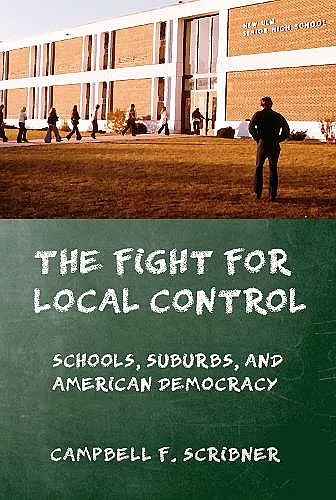The Fight for Local Control
Schools, Suburbs, and American Democracy
Format:Hardback
Publisher:Cornell University Press
Published:7th Jun '16
Currently unavailable, and unfortunately no date known when it will be back

Throughout the twentieth century, local control of school districts was one of the most contentious issues in American politics. As state and federal regulation attempted to standardize public schools, conservatives defended local prerogative as a bulwark of democratic values. Yet their commitment to those values was shifting and selective. In The Fight for Local Control, Campbell F. Scribner demonstrates how, in the decades after World War II, suburban communities appropriated legacies of rural education to assert their political autonomy and in the process radically changed educational law.
Scribner’s account unfolds on the metropolitan fringe, where rapid suburbanization overlapped with the consolidation of thousands of small rural schools. Rural residents initially clashed with their new neighbors, but by the 1960s the groups had rallied to resist government oversight. What began as residual opposition to school consolidation would transform into campaigns against race-based busing, unionized teachers, tax equalization, and secular curriculum. In case after case, suburban conservatives carved out new rights for local autonomy, stifling equal educational opportunity.
Yet Scribner also provides insight into why many conservatives have since abandoned localism for policies that stress school choice and federal accountability. In the 1970s, as new battles arose over unions, textbooks, and taxes, districts on the rural-suburban fringe became the first to assert individual choice in the form of school vouchers, religious exemptions, and a marketplace model of education. At the same time, they began to embrace tax limitation and standardized testing, policies that checked educational bureaucracy but bypassed local school boards. The effect, Scribner concludes, has been to reinforce inequalities between districts while weakening participatory government within them, keeping the worst aspects of local control in place while forfeiting its virtues.
An excellent book forces the reader into such thorny terrain, and Scribner's important and meticulously researched study clearly does that. In sum, his brilliantly argued book should seriously interest this journal’s readers, and its careful and accessible prose also makes it suitable for advanced undergraduates in both history and education policy programs.
-- Jon Shelton, University of Wisconsin-Green Bay * History of Education Quarterly *Especially for a first book based on a dissertation, the reach of The Fight for Local Control—spanning multiple cities and towns across a half-century in realms from court cases to curriculum controversy to fiscal and union politics—is impressive and, at moments, astonishing.... Scholars of history, education, politics, and policy are lucky this important volume exists.
-- Natalia Mehlman Petrzela * American Historical Review *As fundamental questions about publicly governed education are intensely debated in the United States today, Scribner makes a valuable contribution to historians' understanding of the freighted and protean concept of "local control."
* JOURNAL OF AMERICAN HISTOISBN: 9781501700804
Dimensions: unknown
Weight: 454g
256 pages